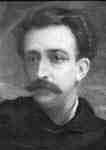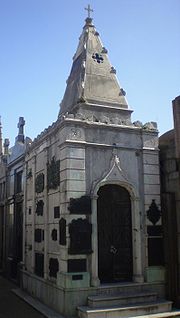
José Manuel Estrada
Encyclopedia

Argentina
Argentina , officially the Argentine Republic , is the second largest country in South America by land area, after Brazil. It is constituted as a federation of 23 provinces and an autonomous city, Buenos Aires...
politician, eminent speaker and representative of Catholic
Roman Catholic Church
The Catholic Church, also known as the Roman Catholic Church, is the world's largest Christian church, with over a billion members. Led by the Pope, it defines its mission as spreading the gospel of Jesus Christ, administering the sacraments and exercising charity...
thought.
Biography
José Manuel Estrada, with other thinkers and political defenders of Catholic thought such as Pedro Goyena and Emilio Lamarca, stood out in Argentinean history for their firm opposition to the SecularismSecularism
Secularism is the principle of separation between government institutions and the persons mandated to represent the State from religious institutions and religious dignitaries...
that characterized the government of the country between the second half of the 19th century and the first decades of the 20th century.
President Sarmiento designated him Secretary of External Relationships and head of the General Department of Schools. He was elected deputy for Buenos Aires (1873–1876). He founded the newspaper The Argentinean. Between 1876 and 1888 he acted as Rector of the National Association of Buenos Aires.
He made an important contribution to the Pedagogic Congress of 1882, where it was agreed that the state school system should be Catholic
Catholic
The word catholic comes from the Greek phrase , meaning "on the whole," "according to the whole" or "in general", and is a combination of the Greek words meaning "about" and meaning "whole"...
, maintaining this position in a long debate with Leandro Alem
Leandro Alem
Leandro Nicéforo Alem was an Argentine politician, born in Buenos Aires, a founder and leader of the Radical Civic Union. Alem was the uncle and political teacher of Hipólito Yrigoyen. His father, was the chief of Rosas' political police, the Mazorca. He was executed after the battle of Caseros...
. This was opposed to the Law 1420 of 1884 for public, free and compulsory teaching that established the lay public school system. He was also opposed to the Law of civil marriage sanctioned in 1888, representing the opinion of the Catholic thinkers.
In 1885 he was appointed president of the recently founded Catholic Union. In 1888 he was re-elected as national deputy.

University of Buenos Aires
The University of Buenos Aires is the largest university in Argentina and the largest university by enrollment in Latin America. Founded on August 12, 1821 in the city of Buenos Aires, it consists of 13 faculties, 6 hospitals, 10 museums and is linked to 4 high schools: Colegio Nacional de Buenos...
and he stood out as a journalist in the magazine The Union that he directed along with Pedro Goyena and Tristán Achával Rodríguez, where they defended their positions in opposition to the liberal reforms of the governments of that time, whose main advocate was Julio A. Rocha.
In 1891 he accepted the position of Plenipotentiary Minister in Paraguay
Paraguay
Paraguay , officially the Republic of Paraguay , is a landlocked country in South America. It is bordered by Argentina to the south and southwest, Brazil to the east and northeast, and Bolivia to the northwest. Paraguay lies on both banks of the Paraguay River, which runs through the center of the...
, where he died in 1894.
His remains lie in the cemetery of La Recoleta
La Recoleta Cemetery
La Recoleta Cemetery is a famous cemetery located in the exclusive Recoleta neighbourhood of Buenos Aires, Argentina. It contains the graves of notable people, including Eva Perón, Raúl Alfonsín, and several presidents of Argentina.- History :...
. A monument was erected to him in the Plaza Loria in 1947.
In commemoration of his death, the professor is celebrated each September 17 in the Republic of Argentina.
Publications
- El génesis de nuestra raza, 1861.
- El catolicismo y la democracia, 1862.
- Ensayo histórico sobre la revolución de los comuneros del Paraguay en el siglo XVIII, 1865.
- Lecciones sobre la Historia de la República Argentina (Recopilación de sus clases en el Colegio Normal)

